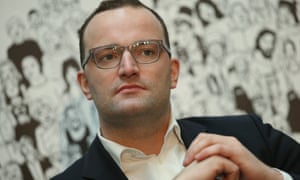
Over the 11 years that Angela Merkel has been at the top of German politics, steering her country through global financial crashes, European debt crises and the aftershocks of wars in the Middle East, she has been able to rely on one constant: the loyalty of her party. If Merkel’s reign has looked so solid, it has partly been because the Christian Democrat leader hasn’t had to see off challenges from within her own ranks.
But one year on from the height of Europe’s refugee crisis, that situation is changing. While Merkel’s ratings are still strong enough for only a minority to expect her not to run for re-election next year, her liberal stance on the refugee question has for the first time opened up a political space for a challenger from her own party.
Over the summer, the darkening tone of Germany’s political debate has been set not by Merkel’s optimistic slogan of “we will manage”, but by a politician who describes himself as a “burkaphobe”, who calls on Muslim men to be less uptight about showering naked in public gyms, and criticises his leader’s crisis management in all but name. Meet Jens Spahn, the MP for Steinfurt and Borken, deputy finance minister and, if some commentators are to be believed, Germany’s chancellor-in-waiting.
Defending the partial ban of the full-face veil that the government wants to introduce following his proposal, he says bluntly: “Germany may not be the right country for those who want to keep their wife in a burka or niqab, especially now that we have become such a sought-after destination for so many. We need to send some strong signals about what is acceptable and what isn’t.”
He told the Observer: “The German people want to help refugees, but they want to help in an orderly way.”
Only 36 and openly gay, Spahn may not seem the most likely candidate to lead a conservative rebellion within Merkel’s Christian Democratic Union. “A political path like mine would certainly have been rockier 10 years ago,” he admitted. When he first ran as a candidate in the deeply Catholic Münsterland region, some in his party ran a smear campaign to stop him. “Obviously, it didn’t work.”
But he rejects the idea that his lifestyle runs counter to his politics. “I don’t see the contradiction. Germany’s dominant culture and lifestyle has become a lot more liberal in the last 10 years, whether you are looking at gays and lesbians or at immigration. But my biggest fear is that this new openness is under pressure – from a very conservative form of Islam and a rightwing backlash against immigration – and that we will have to fight very hard to preserve it.” When criticising cultural norms in the Arabic world, he deliberately uses the word spiessig, meaning prissy or narrow-minded – a term in the past often associated with his own party.
With a combativeness that can border on arrogance, Spahn first gained a profile as the CDU’s health policy spokesman, repeatedly calling for reforms of the pension system and data protection regulation – usually two holy cows in German political debate. Having looked like a shoo-in for a ministerial post, Spahn was parked in a junior role in the finance ministry after the 2013 federal election – a move that some read as a slapdown for the uppity young politician. But in his current role, reporting to influential veteran finance minister Wolfgang Schäuble, Spahn has been granted a licence to roam across the political field, holding forth on anything from dual citizenship to raising the pension age.
Coming from a party that has never openly rebelled against its leader, Spahn is still careful in phrasing criticism of the government. He insisted that he hoped Merkel would run again at the federal elections in 2017 and vehemently rejected the notion that Germany made a “mistake” at the height of the refugee crisis: “The decision of 4 September was correct and logical,” he says. The “but” is not long in the coming. “But we should have been quicker to make clear that it was an exceptional situation.
“We all underestimated the power of how mobile phones and social media could change migration movements … It is certainly not false that no one in Germanyhad predicted the extent to which other countries were not prepared to help with the refugee crisis.”
But his demands on the party leader are unequivocal. “It is very important that the German government makes it clear that we have won back control since September and October last year, when we had clearly lost control of the situation due to irregular immigration on the Greek-Turkish border,” he said. “And it’s very important that we make clear we are aware of the vast challenge of integration. Integration is not just a matter of a two-week language course.”
On the consequences of Britain’s vote to leave the European Union, by contrast, Spahn sounds more doveish than others in his party, or even in the finance ministry. While he said there was “nothing I regret more than Britain leaving the European Union”, he criticised politicians “putting the boot into Britain”. Instead, he said, “we should ask what drove so many people to say: ‘That European Union is not my own.’ That’s the debate we should be having in Germany, too: does Germany want to be part of a European Union that a majority of Brits don’t feel belongs to them?”
In words that will be received with interest in the offices of the British “Brexit ministers”, David Davis and Liam Fox, Spahn appeared supportive of the idea of Britain leaving the single market and instead negotiating a bespoke, “Canada-style” trade deal with the EU. “You can’t have the one-for-one rules of the single market without free movement. And if you want to have the single market, why leave in the first place? Because in that case you would have to subscribe to the very same rules that are being decided in Brussels without having a say. You may want that, but it wouldn’t make much sense.
“Both sides, and especially Germany, have a great interest in strong economic ties. If you can have a free trade agreement with the US, with Canada, and even with communistic Vietnam, then we’ll get a sensible trade agreement with Great Britain if the will is there.”
Spahn dismissed the EU’s delays in ratifying a free-trade deal with America and Canada as uniquely German reservations rooted in anti-American prejudice. Striking a deal with Britain, he said, would be easier to communicate politically. “Most Germans have a positive image of Britain, and I don’t think the majority of Germans are against free trade, per se.”
Nevertheless, Spahn said it should be up to the EU to negotiate such a deal. “If you say the European Union is responsible for free-trade deals, which it is, and the European parliament has got democratic legitimacy too, then it would be up to the EU to negotiate such a deal with Great Britain. But before we start talking about how we can start to couple again, we need to talk about the decoupling first.”
RISE OF JENS SPAHN
16 May 1980 Born in Ahaus near Münster, then in West Germany.
1997 Became a member of the Christian Democratic Union.
2002 Elected to parliament for the constituency of Steinfurt and Borken in North Rhine-Westphalia.
2003-08 Studied political science and law at the university of Hagen, graduating with a master’s degree.
2012 His homosexuality made public in an article in the Süddeutsche Zeitung.
2015 Appointed deputy minister in the finance ministry.
[Source:-THE GUARDIAN]




